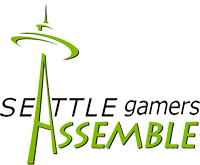Forming a Gaming Community: Difference between revisions
No edit summary |
|||
| Line 53: | Line 53: | ||
* Miniatures games | * Miniatures games | ||
* Wargames | * Wargames | ||
* Card games | |||
* Live-action role-play (LARP) | * Live-action role-play (LARP) | ||
* Console or online gaming | * Console or online gaming | ||
| Line 65: | Line 66: | ||
* Gaming clubs and associations | * Gaming clubs and associations | ||
* Gaming stores | * Gaming stores (RPGs but also board games, card games, miniatures, hobby stores, etc.) | ||
* Comic book stores | * Comic book stores | ||
* Book stores, especially those specializing in science-fiction and fantasy | * Book stores, especially those specializing in science-fiction and fantasy | ||
Revision as of 22:05, 3 January 2007

Seattle Gamers Assemble! (SGA) is a loose community of role-players centered around Seattle, Washington. After several years of operations, we thought it might be nice to share what we've learned about setting up a gaming community.
(Article in progress; these are merely some talking points that will be developed over the next few days.)
WHAT IS A GAMING COMMUNITY?
In this article, we mean by "gaming community" a group of people that adopts a certain structure or organization to support game-related activities. At SGA, we focus on role-playing games but most of this advice is directly applicable for other types of games.
People
- Different skills and interests
- Newcomers and people without a regular game looking to form small gaming groups
- People looking for drop-in games or players
- People who like to try different games
- Game designers looking for playtesters or actual play
Structure
- Online group
- Gaming circle
- Game club
- Meetup group
Activities
- Weekly games: See our article on Weekly Short-Shots
- Meetups
- Bring-and-battle
- Tournaments
- Mini-conventions/Game Day
- Full-scale conventions
- Social events
LINKING UP
Online Presence
- Mailing list
- Meetup group
- Yahoo! group
- Gaming blog
- Wiki
Networking
A community is a fractal beast: communities can network into larger communities. Don't limit your horizons with a very narrow definition of what your group is about, at least not on first approach. Sure, if you play DnD or Exalted in a metropolitan area you can probably find enough players to get a game going and even to organize events. But why not start wider and meet more people? If the community is very large, it will sub-divide soon enough anyway. But most of the time, you will find the opposite problem: too few people rather than too many. So how do you build your local gaming community?
Ask yourself: Who else is out there that shares your hobby? Although our main focus at SGA and in this article is role-playing games, most of us are interested in many other related activities:
- Board games
- Miniatures games
- Wargames
- Card games
- Live-action role-play (LARP)
- Console or online gaming
- Comic books
- Science-fiction and fantasy
- Creative writing
- Game design
- Theatre
- Movies
So your contacts in the local community might include:
- Gaming clubs and associations
- Gaming stores (RPGs but also board games, card games, miniatures, hobby stores, etc.)
- Comic book stores
- Book stores, especially those specializing in science-fiction and fantasy
- LAN gaming oufits
- Writing groups and workshops
- Improv theatre groups and workshops
- Movie clubs
- Local game publishers
- High schools, colleges and universities
PROMOTING
Creating Buzz
- People
- Events
- Locations
Promotional Materials
- Posters
- Handbills
- Ads
RESOURCES
- Game Circles: Bringing gamers together
- Games Workshop's gaming club resources
- Negative Space's Role-Playing Meeting Grounds
- Wikipedia:Game club (article stub)
(To be continued.)
Return to Seattle Gamers Assemble!